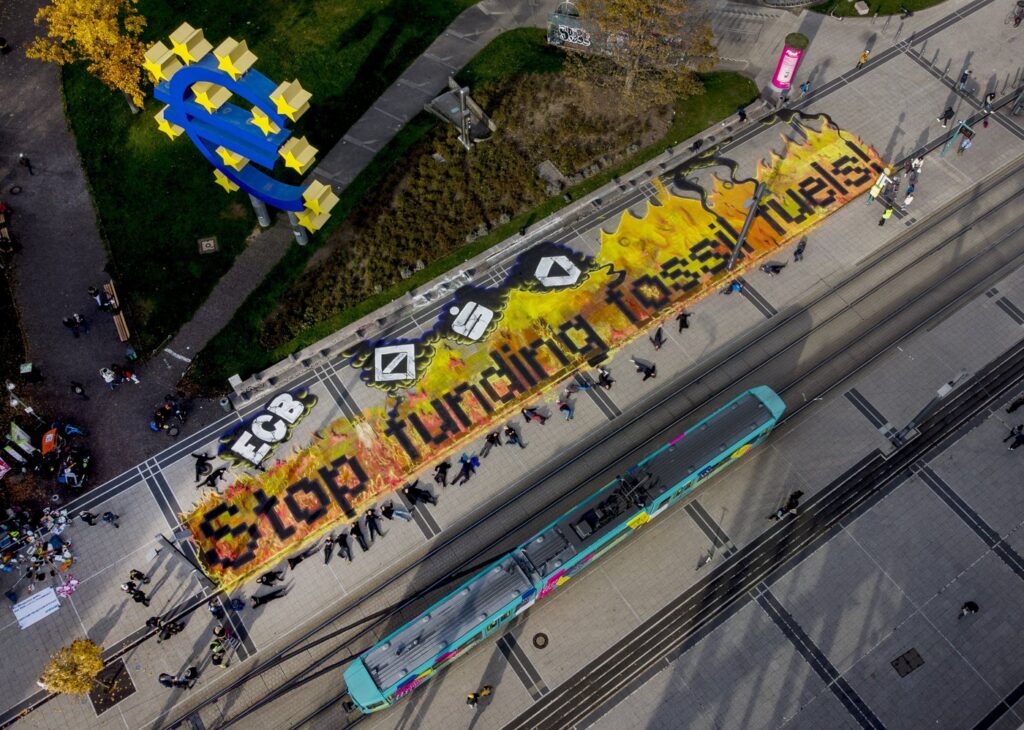Associate Press copy is provided via The Canadian Press

Climate activists lie after painting “stop funding fossil fuels” on the square in front of the Euro sign in Frankfurt, during “Fridays for Future” event, Oct. 29, 2021. Insurance companies that have long said they’ll cover anything, at the right price, are increasingly ruling out fossil fuel projects because of climate change — to cheers from environmental campaigners. (AP Photo/Michael Probst, File)
Michael Probst
BERLIN (AP) — Insurance companies that have long said they’ll cover anything, at the right price, are increasingly ruling out fossil fuel projects because of climate change — to cheers from environmental campaigners.
More than a dozen groups that track what policies insurers have on high-emissions activities say the industry is turning its back on oil, gas and coal.
The alliance, Insure Our Future, said Wednesday that 62% of reinsurance companies — which help other insurers spread their risks — have plans to stop covering coal projects, while 38% are now excluding some oil and natural gas projects.
In part, investors are demanding it. But insurers have also begun to make the link between fossil fuel infrastructure, such as mines and pipelines, and the impact that greenhouse gas emissions are having on other parts of their business.
“Like banks, insurers can leverage access to their services as an incentive to reduce greenhouse gas emissions or exposure to the physical risks of climate change,” said Jason Thistlethwaite, an expert on the economic impacts of extreme weather at the University of Waterloo, Canada.
“It’s the same idea as an insurance company raising your property insurance rates because you engage in risky behavior, like drunk driving,” he added. “But in this case, it’s the fossil fuel sector that’s engaging in risky behavior by contributing to climate change.”
In some insurance markets, such as Florida, people are already struggling to get coverage for hurricanes and other disasters that are forecast to become more potent with global warming.
“If climate change continues at its current rate, markets where they can provide insurance at a rate people can afford will erode,” said Thistlethwaite.
Earlier this month Munich Re, one of the world’s biggest reinsurers, said it would stop backing new oil and gas fields beginning next April.
“Insurance is the Achilles heel of the fossil fuel industry and has the power to accelerate the transition to clean energy,” said Peter Bosshard, the report’s author.
That’s because projects that require large amounts of capital are unlikely to attract investment if they can’t get insurance to cover potentially costly mishaps.
“It’s not ideal for a large scale fossil fuel project to lose a brand name insurer with a good reputation,” said Thistlethwaite. “Smaller insurers are likely to fill the gap, but they could be more expensive.”
Insure Our Future said its annual scorecard of 30 companies ranked Allianz, AXA and Axis Capital best for their coal exit policies, while Aviva, Hannover Re and Munich Re came out on top for oil and natural gas.
By contrast, some insurers such as Berkshire Hathaway, Starr and Everest Re have adopted few or no restrictions coal, oil or gas projects, it said. The alliance also criticized Lloyd’s of London for announcing plans for ending coal coverage two years ago but then declaring it optional.
Many of the insurers reviewed introduced their restrictions in the last year, though the exact policies differ significantly, the report said.
Some countries have meanwhile proposed applying the idea of insurance to help nations facing massive costs due to climate change.
Germany, which chairs the Group of Seven leading economies, and the V20 alliance of vulnerable nations, chaired by Ghana, last week agreed to promote the idea of a “global shield” against climate risks.
The proposal, to be discussed at next month’s United Nations climate summit in Egypt, partly addresses demands from poor countries for more financial help to cope with the loss and damage resulting from rising global temperatures.
Thistlethwaite said such schemes will require private sector involvement.
“Western governments are unwilling to shoulder the climate risk liability they are ultimately responsible for,” he said.
- 0085 Turnbull snow removal call office0085 Turnbull snow removal call office
- 0110 SaskEnergy SEI_Network_Members_Burn_Brighter0110 SaskEnergy SEI_Network_Members_Burn_Brighter
- 0109 SaskPower SASPO_2817_PLT_Recruitment_DIVERSITY0109 SaskPower SASPO_2817_PLT_Recruitment_DIVERSITY
- 0105 SaskEnergy Commitment to Safety0105 SaskEnergy Commitment to Safety
- 0102 Lori Carr Coal Extended0102 Lori Carr Coal Extended
- 0100 Turnbull Project Manager0100 Turnbull Project Manager
- 0099 Mryglod Steel 1080p0099 Mryglod Steel 1080p
- 0097 Eagle Sky Ventures LTD0097 Eagle Sky Ventures LTD
- 0095 Fast Trucking nearly 70 years good at it0095 Fast Trucking nearly 70 years good at it
- 0092 Turnbull projects big and small0092 Turnbull projects big and small
- 0046 City of Estevan This is Estevan Teaser0046 City of Estevan This is Estevan Teaser
- 0077 Caprice Resources Stand Up For Free Speech0077 Caprice Resources Stand Up For Free Speech
- 0061 SIMSA 2024 For Sask Buy Sask0061 SIMSA 2024 For Sask Buy Sask
- 0051 JML Hiring Pumpjack assembly0051 JML Hiring Pumpjack assembly
- 0049 Scotsburn Dental soft guitar0049 Scotsburn Dental soft guitar
- 0041 DEEP Since 2018 now we are going to build0041 DEEP Since 2018 now we are going to build
- 0032 IWS Summer hiring rock trailer music
- 0022 Grimes winter hiring
- 0021 OSY Rentals S8 Promo
- 0018 IWS Hiring Royal Summer
- 0013 Panther Drilling PO ad 03 top drive rigs
- 0002 gilliss casing services0002 gilliss casing services
- 9002 Pipeline Online 30 sec EBEX9002 Pipeline Online 30 sec EBEX
- 9001
